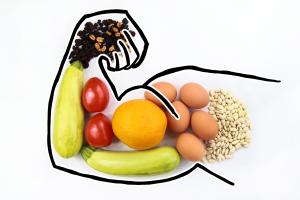Dr. David Samadi: 5 Foods helping naturally boost testosterone levels
New York City urologist and prostate cancer surgeon says fueling your masculinity by what you eat may help
This topic is timely because studies show that by 2025, approximately 6.5 million men between the ages of 30 and 79 in the United States will have symptomatic hypogonadism caused by androgen deficiency.(1) This represents a 38% increase from population estimates in 2000.
Testosterone deficiency, also known as androgen deficiency, can occur for two reasons. It may happen because the testicles are unable to produce testosterone correctly (called primary hypogonadism). Secondly, it may also occur due to hormonal problems that control the testicles' function to produce testosterone (called secondary hypogonadism). Men with low testosterone levels may experience various quality-of-life symptoms such as muscle loss, reduced bone density, anemia, depression, irritability, and erectile dysfunction.
Defining the role of testosterone in men
The primary hormone that plays a crucial role in sex differentiation, sperm production, and fertility in men is testosterone. This male hormone also contributes to adequate muscle growth and muscle strength, bone density, sex drive, fat distribution, and red blood cell production.
Men's testosterone levels naturally decrease by approximately 1% yearly, with each passing birthday beginning around age 40 and a more rapid decline occurring around 60. However, some men experience low testosterone levels that can lead to symptoms and increase the risk of complications such as depression, type 2 diabetes, obesity, and cardiovascular disease.
Various factors, including hormonal and testicular disorders, chronic illnesses, certain medications, and genetic conditions, can cause low testosterone levels.
To diagnose low testosterone, a man must have a total testosterone level of less than 300 nanograms per deciliter on two separate occasions while experiencing symptoms.
Food’s role in boosting testosterone
Men who make dietary changes to improve their health now will also make a significant difference in their future health. It's always highly recommended that men consume nutritious foods with a wide variety of nutrients, including fruits, vegetables, whole grains, lean proteins, healthy fats, and antioxidant-rich foods like berries, leafy greens, nuts, and seeds.
For men looking to fine-tune their diet by adding foods that may give a jump-start to their masculinity, here are five foods containing nutrients to help increase testosterone levels naturally.
Eggs
A good source of vitamin D and cholesterol, eggs provide these nutrients that are crucial precursors to the production of testosterone. Various studies have pointed out a strong correlation between vitamin D and testosterone levels.(2) Thus, incorporating eggs into your diet can significantly impact your testosterone levels.
Fatty Fish
Fatty fish like mackerel, salmon, and tuna are rich sources of omega-3 fatty acids. Studies have linked these fatty acids to increased testosterone levels and improved sperm quality.(3)
Leafy Greens
Be sure to eat spinach, broccoli, and kale, as these leafy greens are rich sources of magnesium, a mineral that can help regulate testosterone levels.
A thorough review of studies has shown a strong correlation between magnesium intake and testosterone levels - the higher the magnesium intake, the higher the testosterone levels. One study found that taking 10 milligrams of magnesium per kilogram of body weight daily for four weeks increased free and total testosterone levels in sedentary men and athletes.(4)
Pomegranates
Pomegranate juice is packed with antioxidants, which have been found to potentially improve testosterone levels, sperm quality, and erectile function. In a small study, 60 men drank pomegranate juice daily for two weeks and saw a significant increase in salivary testosterone levels after just one week.(5)
Oysters
Look no further than oysters to boost testosterone production. Abundantly rich in zinc, necessary for testosterone production, men with low zinc levels are likelier to have reduced testosterone levels.
Research has found that men may help raise testosterone levels safely by taking 220 milligrams of zinc sulfate twice a day for up to four months.(6)
While the best source of zinc is oysters, zinc is also found plentiful in red meat and poultry.
References:
1)https://www.ncbi.nlm.nih.gov/pmc/articles/PMC7719445/#:~:text=It%20is%20estimated%20that%20in,will%20have%20symptomatic%20testosterone%20de
ficiency.&text=Early%20recognition%20and%20detection%20of,be%20treated%20if%20diagnosed%20early.
2) https://pubmed.ncbi.nlm.nih.gov/31953167/
3) https://jamanetwork.com/journals/jamanetworkopen/fullarticle/2758861?utm_source=For_The_Media&utm_medium=referral&utm_campaign=ftm_links&utm_term=011720
4) https://pubmed.ncbi.nlm.nih.gov/20352370/
5) https://www.endocrine-abstracts.org/ea/0028/ea0028p313
6) https://pubmed.ncbi.nlm.nih.gov/30767598/
Dr. David Samadi is the Director of Men’s Health and Urologic Oncology at St. Francis Hospital in Long Island. He’s a renowned and highly successful board certified Urologic Oncologist Expert and Robotic Surgeon in New York City, regarded as one of the leading prostate surgeons in the U.S., with a vast expertise in prostate cancer treatment and Robotic-Assisted Laparoscopic Prostatectomy. Dr. Samadi is a medical contributor to NewsMax TV and is also the author of The Ultimate MANual, Dr. Samadi’s Guide to Men’s Health and Wellness, available online both on Amazon and Barnes & Noble. Visit Dr. Samadi’s websites at robotic oncology and prostate cancer 911.
David Samadi
Madison Urology
+1 212-365-5000
email us here
Visit us on social media:
Facebook
Twitter
LinkedIn
Instagram
YouTube
Boost your testosterone levels with these 4 simple foods
Legal Disclaimer:
EIN Presswire provides this news content "as is" without warranty of any kind. We do not accept any responsibility or liability for the accuracy, content, images, videos, licenses, completeness, legality, or reliability of the information contained in this article. If you have any complaints or copyright issues related to this article, kindly contact the author above.


